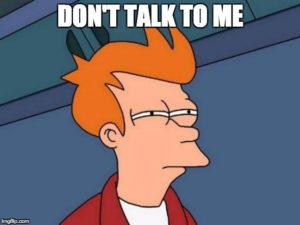 I love bathroom breaks, especially when it’s time to get down to uhm, “serious business”. That’s the only time in my day when I get to mindlessly scroll through Facebook and Quora without feeling guilty.
I love bathroom breaks, especially when it’s time to get down to uhm, “serious business”. That’s the only time in my day when I get to mindlessly scroll through Facebook and Quora without feeling guilty.
But this week, as I sat down in my usual cubicle, I started to panic. As part of an experiment, I had a self-imposed ban on my phone during any “in-between moments” of less than 5 minutes. Instead, I had to just sit there and well, do what I had to do.
If you read last week’s post, you’ll know that I started this experiment to try to boost my creativity. Dozens of you emailed me to join in, and today, I want to report back on the results.
I didn’t have any creative breakthroughs to cure cancer or discover the Meaning Of Life, but here are some unexpected benefits which I (and those who joined in) encountered:
I Stopped Trying To Be Productive All The Time
You know how a smoker feels super uncomfortable when he’s trying to quit? Discomfort is one of the biggest telltale signs of addiction.
I’m not a smoker, but this week I realised that I was addicted to the FEELING of being productive. I get really uncomfortable when I spend stretches of time not doing something “useful”. So whenever I’m in a queue, or waiting for a bus, I’m always checking email, reading an article, or crafting a blogpost, because I absolutely hate “wasting time”.
When did life become some crazy race to get everything done? Why was I chasing down all this work in the first place?
An athlete trains by alternating between periods of hard training and periods of complete rest. The best violinists take regular naps between practice sessions. Peak performance research shows that employees can boost productivity by taking more time for rest and renewal during the day.
And yet, here I was pushing my brain with stimulus after stimulus, in a bid to feel more “productive”.
This was one of the biggest insights for me: That I could spend my in-between moments taking a real break, and my world would not crash. In fact, I was probably MORE productive because the downtime gave my brain the space to recover and start work afresh.
I Became More Open To Socializing
Sometimes, I just don’t feel like talking to people. This is generally not a good thing and makes me look like this in the morning:
What puzzled me was WHY I was so hesitant to interact with people. Once I start talking, I can usually carry out fairly normal conversations without having people back away from me slowly (most of the time). So why was I so reluctant to start conversations?
This week, I found out why. Say I’m riding the elevator up to the office, and I whip out my phone to check email or read an article. My brain goes into “Read and Analyse” mode, so it shuts down all my social skills. Switching out of “Read and Analyse” mode to “Being Friendly” mode takes time and effort, so it’s simply easier to avoid eye contact.
You’re probably now starting to suspect that I’m actually a robot (My sensors are detecting an anomalous level of skepticism from you), but the fact remains that there are “switching costs” to everything – especially your moods.
So without distracting myself with my phone, my brain remained nicely in “I’m bored” mode this week. That made me more open to interacting with folks around me just to entertain myself.
That’s also why the worst thing I could do at a party is whip out my phone and check Facebook. It makes me look like a complete loser, and also hinders my willingness to interact with people.
I Became More Aware Of Things Around Me (Reader Perspective)
Okay, this one didn’t really impact me, because I spent a lot more time daydreaming or thinking about ideas than actually being aware of stuff going on around me.
But a couple of my readers experienced some heightened awareness (and creativity!) when they weren’t distracting themselves with their phones:
I found myself having more time to reflect and as a result found more reasons to be thankful for things around me. – Priscilla
I started to question (in a good way) why the directions of stairways and escalators were not designed to be more conducive for opposing human traffic. I had a line of questioning: “Why do people have to ‘clash’ into each other to get to the other side?” An idea/possible solution showed up: A simple switch between the escalator directions – up and down – would reduce that issue. – Mitchell
Those insights might seem pretty mundane, but imagine if you had just one idea every day. That’s 365 new ideas a year – don’t you think that one of them could lead you to a promotion, a new business idea, or at least make you sound way smarter at dinner parties?
And if you could train your brain to notice stuff all the time, could you pick up on more subtle clues and body language when it really matters, like on a date, at a client meeting, or meeting important dignitaries?
It’s Okay To Be Bored. Really.
We live in a world where we never have to be bored. If we wanted to, we could entertain ourselves with Facebook, TV shows, YouTube, email, and an endless, neverending stream of media.
Our brains just aren’t equipped to handle that sort of constant stimulation. There’s already evidence that the prevalence of smartphones may be destroying a generation of teens.
We’re so terrified of being bored. But if we could embrace that boredom just a little, we’d realise that there’s so much more going on in the world around us than on that little tiny screen we carry around all day.
Give yourself a chance to be bored and see what happens. Even if nothing else happens, you’ll spend a lot less time in the toilet. Which might actually be a good thing.
Have you tried being bored this week? Let me know how you felt in the comments below.

Free time often means a confrontation with the self and we fear it because we are so bothered by our poor relationship with time itself. We would rather make use of work to mask the parts of ourselves that are the most unknown, and possibly the most abundant. Perhaps an act of imagination is all that is required to resuscitate these free time for ourselves.